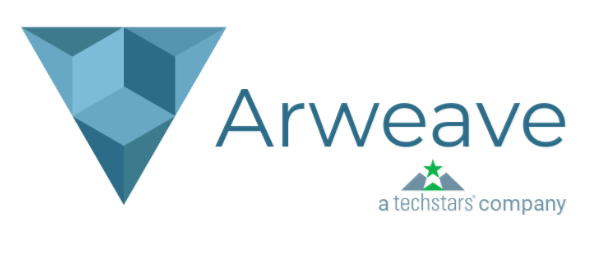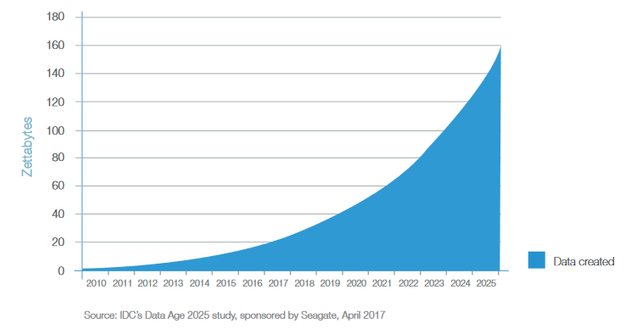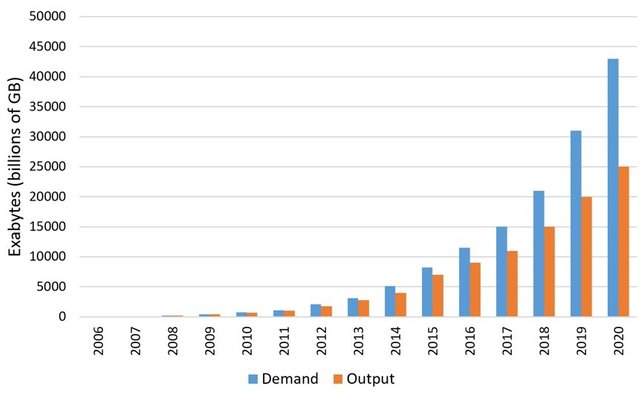The Forever Guarantee
Pay Once, Store Your Data on the Blockchain for Over 100 Years

That's what Arweave (previously known as Archain) is trying to do. And unlike Dropbox or AWS, you don't pay a monthly fee. You buy once, store for generations, and never pay for that storage again, ever.
Sounds good, isn't it?
But is that really necessary? Yes! To know why, let's take a look at digital data — an area that has seen meteoric growth in the past decade or so.

Every second, approximately 8,000 tweets are tweeted; more than 70,000 Google queries are searched; and more than 2.5 million emails are sent. These activities continuously drive the explosive data growth and show no signs of slowing down.
Considering the trends above, we're working with 16.3 zettabytes of data a year today and IDC predicted that amount will rise tenfold, to 163 zettabytes by the year 2025.
If we look at the storage supply vs. demand…

By 2020, demand for capacity will outstrip production by 6 zettabytes, or nearly double the demand of 2013 alone. We're not just in the Zettabyte Era. Soon, we'll be in the "Unavailable" Zettabyte Era. And when demand is growing faster than supply, price will definitely soar.
The only affordable way out — Decentralization

Instead of relying on expensive centralized silos (owned by for-profit businesses) to store data, we can distribute data across a vast network of peers who are paid to store each other's data.
The iCloud hack of 2014 and the Dropbox hack of 2012 also motivated this trend of decentralization, which promises a trustless secure network that is much faster and censorship resistant.
By decentralizing storage, individuals can monetize their unused storage space and businesses can abstract away the potential bottlenecks that prevent new innovative uses of data. This influx of supply into the global storage market will also drive down storage prices, making it more affordable.
Recent years, we've seen many decentralized solutions joining the race to disrupt this data storage industry. Storj, Sia, Filecoin and Bluzelle, all trying to compete for market share.
…so what sets Arweave apart from other decentralized storage solutions?
Scalability and Affordability. As we continue to generate countless zettabytes of data, the question of where and how to store it becomes increasingly important. We need something that's easy to use, sustainable, cheap and still considerably fast in data writing and recall.
5,000 transactions per second is what Arweave promises for data operations on a 100 mbps network. Most competitors can't even come close! Storj and Swarm on Ethereum, are stuck with 15 transactions per seconds until Plasma becomes a reality. Filecoin and Sia rely on data hosts to provide the required performance for better rewards via storage contracts. MaidSafe works on a new non-blockchain consensus that focuses more on fault tolerance over efficiency.
Besides, most other solutions require either a monthly subscription or payment based on data size. Arweave only requires one-time payment for a lifetime access of unlimited data that's stored permanently on the blockchain. In other words, you save more if you're going to store the data over a long period of time.
To have a self-sufficient and sustainable ecosystem, it's also very important to build a large developer community that can create many new applications to address the different needs of businesses, government organisations and individuals, which in turn attracts more users to participate on the platform.
Unlike most competitors, Arweave is built by developers for developers. Their REST APIs allow builders to create Arweave apps in any programming language. This motivates and encourages more users. At the time of writing, Arweave development community has already started building apps even before mainnet launches.
Here are some featured apps that have already been built:

Woah! But how's that possible?
Arweave is built on four technological layers, each of which contributes to a new type of blockchain network that's suited for both fast transactions and low cost permanent storage.
- Blockweave
A new distributed ledger that's designed to provide scalable on-chain storage in a cost-efficient manner. Blockweave is the backbone behind Arweave's project.
By storing your data on-chain, you get all of the benefits (immutability, verifiability, availability, etc.), but most importantly, it gives you the ability to pay once and store forever.
- Proof of Access
Arweave's consensus mechanism is based on proof of access (PoA) and proof of work (PoW). Together, they guarantee data availability at zero cost while assuring that the energy (electricity) used while mining decrease over time.
This is made possible because at Arweave, data storage 'work' offsets hashing 'work'. The more data is stored in the system, the lower the proportion of work in the energy expending hashing side.
- Wildfire
Arweave's self-organising decentralised algorithm that allows the network topology to adapt autonomously to the most efficient routes of information distribution through the use of ranking system and incentives.
As nodes in blockweave require fast access to data in order to mine efficiently, miners are "selfishly" incentivised to store and share data quickly so as to build a positive reputation, which indirectly supports for low-latency, high bandwidth data writing and recall.
- Blockshadows
A fast and flexible block distribution system that ensures transactions are processed and distributed quickly around the network, with consensus about blocks to be achieved at near network speed.
Blockshadows are detailed instructions (e.g. tx hash, wallet list hash) necessary to rebuild a specific bock from its related transactions. Only these small-sized "shadows" are moved around the network, which minimizes congestion and allows blockweave to achieve higher speed with scalability topping at around 5,000 transactions per second.
Who is Arweave for?
A low cost, permanent storage won't be very valuable to a person who wouldn't have any trouble buying tons of physical storage and devising a solid, redundant backup plan on their own.
Based on all that, Arweave seems more geared towards those who don't feel as confident about safeguarding their digital files, and are looking for cheaper and better cloud alternatives. And in that regard, Arweave seems to be offering a lot of peace of mind.
If you have a business, evaluating and mindfully selecting the most suitable and affordable data storage service is a weighty decision. Nowadays, many services like Dropbox, Google drive or One Drive allow you to store data on the "cloud". It's free until you reach a certain limit. After that, the price can reach up to more than $100 per month. Today, Arweave is giving you the possibility to store data at a fraction of the cost and limitless.
As a data storage blockchain protocol, Arweave is well-poised for the huge data economy future. The ability to build on top of a decentralized low-cost blockchain structure that permanently stores your data is a "dream come true" for many businesses or developers.
Now, not only can you store personal and corporate files for a one-time fee instead of monthly subscription, you can also have many opportunities and possibilities. Here are two examples that I love to see happening in the near future:
Decentralized Identity: Since data can be saved permanently and tamper-proof, we can have our personal identity created online, stored and accessed digitally. After that, probably we don't even need a physical ID card to prove who we are.
Decentralized P2P File Sharing: Have you ever felt annoyed when you finally got hold of that torrent file, but then there's no seeders online every time? This can change with Arweave! Imagine a P2P file sharing network where there's always at least 1 seeder, no matter what. The best part - other than guaranteed anonymity, the file is stored forever (no third parties are able to take them down).
…so who's behind this awesome product?


Sam Williams, the CEO of Arweave, is leading a team of 8. Although it seems that most of them are fresh graduates, they've been working diligently and tirelessly over the past year. They've got an active Github with good documentation and recently, they've been admitted to the prestigious TechStars program. That's a great validator.
They also have some solid advisors:
Anthony Ryan: Head of Growth at Quantstamp, mentored at Startup Weekend, sold numerous online businesses, and has been investing in crypto since 2014.
Jesper Noehr: Founder and former CEO of Bitbucket, previously employed with Opera, Atlassian, and multiple hedge funds. Has specialist expertise and interest in distributed systems, cryptocurrencies, quantitative trading and economics, among many others.
Jeremy Epstein: CEO of Never Stop Marketing, has 20 years of international marketing experience in helping to bring innovative technologies into the mainstream. Former advisor to IOTA and other successful cryptocurrency projects.
Bruno Meireles de Sousa: High performing executive, with 20 years' experience as a global business leader who has succeeded in delivering significant results and business change in B2B, B2C & B2G across multiple cultures and multiple sectors.
Julian Lenz: Serial entrepreneur (marketing & tech companies), angel investor, Techstars mentor, and a crypto investor since 2013.
Rob Johnson: Managing Director of Techstars Berlin, co-founded Makers Academy and grew it into Europe's largest coding bootcamp.
Fabian Dudek: Entrepreneur and investor working on creating net positive companies. Former CEO and founder of nestpick, founded his first company when he was 14 and since then has launched 4 ventures.
Christian Eggert: Tech entrepreneur and product advisor. 10+ startup and product launches, gaining a vast experience building and growing VC-backed startups.
The list of partners include:
- Techstars (large seed accelerator)
- Upvest
- Northblock
- Shelf Network — They will use Arweave's data structure to store auction listings
- Charité — One of the largest university hospitals in Europe. Remember The Journal of Raw Data from the featured apps? They're the ones working with Arweave to create a new open access scientific journal, utilizing the Arweave network for truly permanent data storage
What's the plan?
Arweave has recently successfully completed their community token sale part one, dedicated to those community members who have been there since the beginning of their journey. They're going to launch part two soon with the below token metrics:
Symbol: AR, native token (ERC-20 won't be issued)
Hardcap: 675,000 USD
Total Tokens: 65 million in total, 55 million Genesis Block and 11 million for mining
Token Price: ~$0.74 USD
Sale Date: Before mainnet launch and run for 4 days
Token Release Date: After mainnet launch
Restricted Countries: USA, China, North Korea, or Iran.
Additional Information:
MVP: Github: https://github.com/ArweaveTeam/arweave.
Mainnet: 8 June, 2018
Okay, tl;dr. Just tell me the summary!
Good:
- Data is the new oil and the economy is expected to continue growing at an explosive rate
- Active and good Github contribution
- Working product (REST APIs) and featured apps developed by community
- Mainnet is launching in few days time, on 8th of June
- Solid partnerships and advisors
- Low cap and good hype (29850 telegram members)
Bad:
- Saturated space with strong competition (but Arweave has innovative edges like proof of access with low-cost permanent storage)
- Lack of important information like roadmap
Finally, Arweave has developed some actual tools you can use today such as archiving via a Google Chrome plug-in or desktop app.
If you would like to stay up to date with all the latest Arweave developments, you can find them in the following places:
Website: https://www.arweave.org/
Telegram: http://t.me/arweave
Twitter: https://twitter.com/ArweaveTeam
Facebook: https://www.facebook.com/ArweaveTeam/
Reddit: https://www.reddit.com/r/Arweave/
Connect with me by following my Steemit or join me at BitcoinTalk
Get a $9.60 Upvote and Your Post Resteemed to My 2 Accounts @a-0-0 & @a-a-a with 72,500+ Followers. Send 5 SBD with Your post URL in MEMO to @a-0-0
Resteemed by @resteembot! Good Luck!
Check @resteembot's introduction post or the other great posts I already resteemed.
You have been upvoted by @rentmoney thanks for participating in our Followers Appreciation Promotion.
I'm all for encrypted PII and the benefits of it will be great for cryptocurrency as well as other digital applications like IOT and eCommerce . but id like to ask you about how you think arewave will stack up to something like civic or even something like Ontology or NULS who could easily intergrate this into a wider blockchain environment at scale
Secondly the data storage market already has storaj and sia so they going after 2 markets that already have more established projects in the field so how do you see a split resource project stack up against a specialised one
Hi @chekohler, thanks for your comment! First of all, from what I gather, Arweave is focusing on building a data storage protocol that dApps can use to store data permanently on-chain. In that regard, Civic can be seen as a partner rather than a competitor. However, if I'm not wrong, Civic is storing PII on the user device. The disadvantage is: when the user changes device, the information is not port over. That's what I experienced many months ago, although I'm not so sure how much of that has changed recently. Nevertheless, Arweave will open up an opportunity for such dApps to fully utilise the benefits of a blockchain - data will always be immutable, available and secured.
As for Ontology and NULS, the focus is rather different. These two are trying to compete in the multi-chain space. But as you said, they could always dive into this area. However in my opinion, it's not advisable for them to try competing in multiple areas when they haven't even delivered their current roadmap. And it wouldn't be wise for them to risk entry into the already crowded data storage market at this stage.
On the other hand, Arweave is not really a split resource project. It's building more capabilities but all together is solely focused on providing a data protocol for permanent storage use cases. However, like you mentioned, the data storage market is seriously crowded with competition. We have storj and sia leading the pack at the moment. But, iirc, these two don't store data on-chain, which mean you don't get the full benefits of a blockchain. I believe they're only using blockchain to store file hashes for data forgery protection, while having the content sliced and distributed across the network participants.
If we consider how Arweave stacks up against these, the ability to pay once and get the storage forever will prove to be more afforable in the long run. Storj, for example, charges by monthly subscription or by data size. At a certain point in time, the running costs will definitely be more than Arweave's. Other than that, these competitors haven't shown much promise in terms of scalability. Some of them are based on Ethereum and its network is susceptible to congestion at times.
In my view, the dApps market is growing and there'll be use cases where permanent storage is needed. There're already a few that's implemented or in progress. So, it's definitely something I'd look forward to.
Geez man thanks for taking the time to answer my questions in such detail lol you’ve really got me curious about this project now and I’ll start doing my research on it when I have some time!
You’ve got some great insights and I’m sure it w lol translate into you blog growing on steemit! I’ll definately be following your posts more closely in future!
No worries bro! Always glad to make new friends in crypto :)